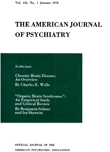Abstract
A questionnaire survey concerning the psychiatric resident and his training has been conducted among a majority (72%) of the residents in 14 major training centers. Of the 169 residents who replied almost all were in the first 3 years of training and had at least 1 year of training at the center from which they reported.
From this survey it appears that the average resident at the time of the study (just before the Korean incident) was about 28 years of age, had been married for 5 years, and had 1 child; 1 in 8 was female. The resident earned approximately $275 per month, which he was likely to consider inadequate for meeting minimal needs. Only two-thirds of the residents received the bulk of their income from the training centers. The rest were, in one way or another, paid by the federal government. Only a few residents had extensive medical experience other than psychiatric training and almost none had extensive formal training in other fields.
The average resident received about 10 hours per week of fairly direct instruction from his seniors. Half of this time was given individually or in small groups of fewer than 12. The resident considers that he needs 2 hours more weekly of such instruction. He considers his patient experience with children and adolescents to be less than adequate. Effort is made to teach him interview techniques, largely by post-mortem conference. He has a 50/50 chance of studying his senior staff's interview technique at first hand and is apt to be better pleased both with this phase of his training and with his seniors if this be the case. Among the auxiliary therapies with which he receives experience he is most apt to value highly group and play therapy. Of those he does not encounter he most wants group therapy and hypnotherapy. Among the training aids, he values most teaching seminars and visiting specialists, both of which he usually encounters. He most wants, if he does not receive it, experience with I-way screen, recording, and 3-way interviews, which all relate to interview technique training through a direct medium. He highly values state hospital experience, especially if he already has it, and wants 3 to 6 months of it.
The orientation of most of the centers is described as Freudian or Neo-Freudian; however, the residents' own orientation is apt to be in this direction regardless of his center's orientation. Residents are apt to think they experience as integration or "over-the-hump" effect in their training, most often by the end of the first year. They ascribe it very largely to their own maturation.
The average resident has mixed goals where work interest is concerned. Almost all want a combination of practice with teaching or research and almost none is interested purely in teaching or in research. The resident is apt to want more training than he will take now. Desire for analytic experience or "analysis" is the most frequently expressed reason for not taking more training now. Income is second.
The large majority of residents are interested in analytic training or treatment. Currently only half feel they have opportunity for this, but 15% are already in analytic treatment or training; 30% have completed arrangements or are in the process of making arrangements. Financial considerations form the largest factor in frustrating the desire for analysis at this stage.
Fewer than half the resident group express interest in doing research; however, 1 in 10 has published work, half of which is "psychic" and half "organic" in nature. Half the residents feel they have opportunity in their training for doing research. Residents are much more apt to be satisfied with their training when this is the case.
As far as resident satisfaction with training is depicted in this study, the subjective factors correlating most highly with the total satisfaction score (of which they form a part) are: the resident's feeling of having been effectively oriented early in his training, his positive estimate of his teachers, his feeling of having an effectively coordinated program of training in a center having good liaison with the other medical services.
Satisfaction with training, as measured here, is also apt to be highly correlated with opportunity for research, for state hospital experience, for satisfactory interview technique training, and for experience with group therapy. There is probably also a significant correlation between satisfaction and satisfied interest in analysis, though this can be outweighed by other factors in the total training program. Satisfaction with training does not appear to be correlated with income nor with opportunity for experience with training aids or associated disciplines.

